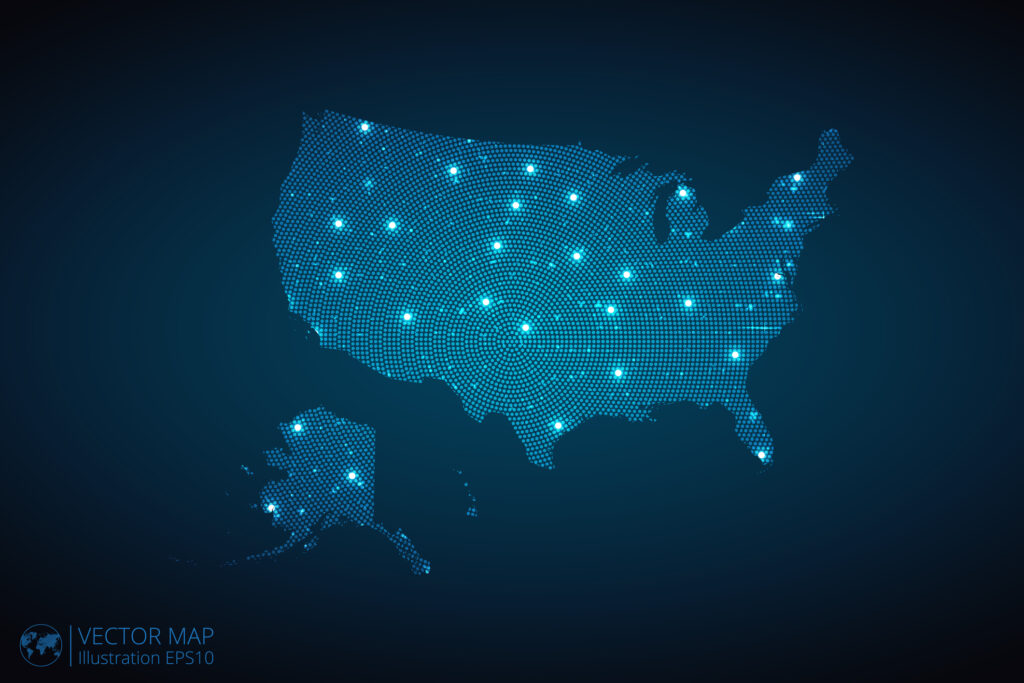Broadband consumers in Tennessee could soon see a significant hike in their monthly bills if legislation now before the state legislature passes. SB 1222 and HB 1111 are companion bills that would allow Tennessee’s electric cooperatives and government-owned utilities to increase the fees they charge telecom companies, including cable providers, to attach fiber optic lines to public utility poles. The bills’ sponsors argue the fee increases will allow the power companies to better maintain the utility poles and keep electricity prices low.
The current average pole attachment rate paid by cable companies in Tennessee is $17 per pole per year, which is 143 percent higher than the national average of $7. Under the proposed bill, the cost of a utility pole would be shared equally among cable companies, Internet providers, and electric companies, and electric utilities would be allowed to charge telecom companies $33 per attachment per pole per year, more than 371 percent of the national average.
Critics of the fee increase argue the legislation benefits only the government-owned power providers while resulting in another broadband tax for consumers and slower broadband investment and development. According to the Chattanooga Times-Free-Press, the bill could create more than $20 million in new costs statewide. The Tennessee Cable Telecommunications Association contends the fee increase will discourage broadband investment in the state: “at $20,000 per mile, the bill could erase 1,050 miles of planned broadband deployment.”
In most instances pole attachment fees are paid to private power companies by private telecom companies, and rates are determined by a combination of market forces and FCC regulations. This is not the case with electric cooperatives and government-owned utilities in Tennessee. The government owns the poles, so the rent is not determined by market forces, and the cost of adding fiber to the poles in borne by the cable companies, so any revenue from the fees is pure profit for the government utility.
Other proposals being considered would take a different approach in determining pole attachment fees. HB 567 and SB 1049 would use a neutral third party to resolve rate disputes, a system in use in several other states.
Increasing the pole attachment fee would constitute a broadband tax increase on consumers. Although telecom companies are obliged to pay a fee for running new fiber on government utility poles, this does not give the government carte blanche to charge exorbitant fees that are ultimately borne by consumers. Tennessee legislators should consider moving to a market-based fee system that benefits everyone, not just one special interest.
The following articles examine utility pole attachment fees and the current proposals, from several perspectives.
Ten Principles of Telecom Policy
https://heartland.org/publications-resources/publications/ten-principles-of-telecom-policyhttps://heartland.org/publications-resources/publications/ten-principles-of-telecom-policy
In this Heartland Institute Legislative Principles booklet, Hance Haney and George Gilder examine the results of telecom reforms in Indiana, the advances made by other innovation leaders in the telecom market, and how other states can follow their lead to reap the rewards of new investment in telecommunications services.
Letter to Tennessee Legislature Regarding Pole Attachment Fees
http://www.ipi.org/ipi_issues/detail/letter-to-tennessee-legislature-regarding-pole-attachment-fees
In a letter to the Tennessee legislature, the Institute for Policy Innovation voices concerns about the pole attachment fee proposal, arguing it allows government-owned utilities to raise prices against their broadband competitors, which would cause discriminatory treatment of competitors, hamper broadband deployment across Tennessee, and expand government power via increased taxes.
Analysis of Pole Attachment Rate Issues in Tennessee
Tennessee Advisory Commission on Intergovernmental Relations
http://www.state.tn.us/tacir/PDF_FILES/Other_Issues/pole%20attachment%20rate%20issues.pdf The Tennessee Advisory Commission on Intergovernmental Relations studies a previous Tennessee bill that addressed pole attachments by cable television and other telecommunications providers to poles owned by cooperative and municipal utility agencies. Although no specific recommendations on the bill were suggested, the study recommended legislation not establish a fixed rate for pole attachments and any rate or cap formula should be strictly cost-based and nondiscriminatory, preferably reflecting the amount of space an attachment occupies.
Pole Attachment Fee Bills a Tax on Broadband Providers, Will Cost TN $20 Million
http://www.ipi.org/ipi_issues/detail/pole-attachment-fee-bills-a-tax-on-broadband-providers-will-cost-tn-20-million
The Institute for Policy Innovation argues the pole attachment fee increase is a broadband tax against private-sector competitors and would result in the loss of $20 million of private investment in the state.
Preserving the Municipal Exemption from Federal Pole Attachment Rates
http://www.publicpower.org/files/PDFs/PoleAttachmentRatesFeb2012IB.pdf
The American Public Power Association gives its position on fee attachment rates and its opposition to rate caps, arguing electricity consumers should not be required to subsidize for-profit attaching entities such as telecommunications and cable companies.
Pole Positions: Comcast Blasts EPB-Backed Bill that Could Raise Fees on Utilities
http://www.timesfreepress.com/news/2013/mar/05/pole-positions-comcast-blasts-epb-backed/
Ellis Smith of the Chattanooga Times-Free-Press discusses the pole attachment fee proposal and speaks with several legislators and companies about the rationale and possible effects of the bill.
Tennessee’s Pole Attachment Tax Is High Enough Already
http://finance.yahoo.com/news/tennessee-pole-attachment-tax-high-163200930.html
The Council for Citizens Against Government Waste voices its concerns about the proposed pole attachment fee increases, arguing the increased costs to broadband providers could suppress broadband investment in the state of Tennessee: “CCAGW is concerned about the unintended consequences this legislation would have on consumers and taxpayers in Tennessee through increased costs and a slowdown to the spread of broadband services to rural areas of the state.”
The Pricing of Pole Attachments: Implications and Recommendations
http://papers.ssrn.com/sol3/papers.cfm?abstract_id=1360940
George S. Ford, Thomas Koutsky, and Lawrence J. Spiwak outline the optimal method of establishing rates for utility poles—Ramsey pricing—where the fixed costs of poles are allocated based on the relative demand elasticities for the attachments. Although historical differences in rates might have been compatible with Ramsey pricing when firms’ service offerings differed substantially, technological convergence dictates these firms should pay a unified rate, they find. The authors find optimal pricing principles prescribe a significantly lower attachment rate for all broadband networks than the current rates. That would promote economic efficiency and increase consumer welfare, they conclude.
A State Legislator’s Guide to Telecom Policy
https://heartland.org/publications-resources/publications/a-state-legislators-guide-to-telecom-policy?source=policybot
Barry M. Aarons and Solveig Singleton of the Institute for Policy Innovation explain in this Legislator’s Guide the issues public policymakers face in considering the future of the U.S. telecommunications.
Nothing in this Research & Commentary is intended to influence the passage of legislation, and it does not necessarily represent the views of The Heartland Institute. For further information on this and other topics, visit The Heartlander’s Tech News Web site at https://heartland.org/topics/infotech-telecom/index.html, The Heartland Institute’s Web site at www.heartland.org, and PolicyBot, Heartland’s free online research database, at www.policybot.org.
If you have any questions about this issue or The Heartland Institute, contact Heartland Institute Senior Policy Analyst Matthew Glans at 312/377-4000 or [email protected].



